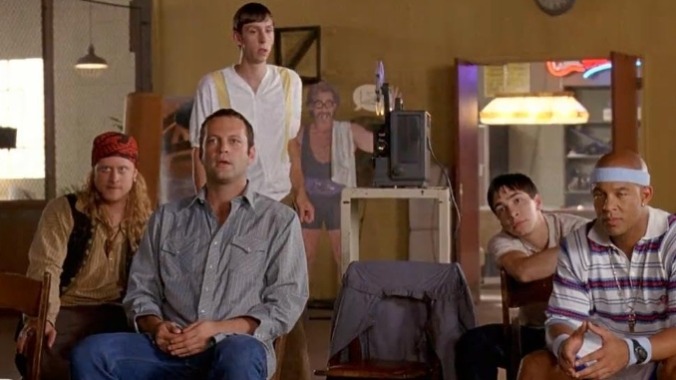
Dodgeball: A True Underdog Story is the purest 2004 comedy, and by that I mean it embodies the cringey, deeply confused values of the 2000s. There’s the trifecta of problematic, badly aged celebrity cameos, including William Shatner, Chuck Norris, and Lance Armstrong – though the latter bit is so well-written that it gets big laughs. There are jokes about fat women (complete with horror strings and a guy getting crushed), jokes about creepy gay rednecks, jokes with Ben Stiller in a fat suit, jokes about Christine Taylor’s character, Kate, possibly being a lesbian, jokes about sumo wrestlers…you get the picture. Dodgeball, like so many “snobs versus slobs” movies before it, tries to have its cake and eat it too, celebrating the Other and individual weirdos while also mocking the people it wants to validate.
I come here, however, not to bury this comedy about a team entering a dodgeball tournament to raise $50, 000, but to celebrate it. At the end of the day, there’s something valuable in a movie which says a man can believe himself to be a pirate, and that is okay. I mean, why the hell not?
Maybe it’s the punk rocker in me, but I still prefer a story about a team of broken misfits trying and nearly failing to save their hangout spot, Average Joe’s gym, to the current day mainstream cultural parade of superheroes, grifters, billionaires, athletes, and wildly successful “owners” whose main attitude is, in essence, “I, a high-powered individual, will conquer the world.” What does it say about the 2020s that one of the richest men on the planet is a version of Dodgeball villain White Goodman (Ben Stiller), a desperately overcompensating, misogynist loser? And how much modern movies have changed that Dodgeball writer/director Rawson Marshall Thurber is now one of Dwayne “The Rock” Johnson’s guys, making bland Netflix action slop like Red Notice with a star who seems increasingly humorless about his superhuman frame? (Shades of how the diminutive Goodman surrounds himself with giant bodybuilders.)
In the 20 years since Dodgeball was released and grossed nearly $170 million on a cheap budget, the theatrical studio comedy disappeared, and pop culture and politics have become even more entwined—and more contradictory. The fact that comedians now face backlash for targeting marginalized people is actually a good thing. However, staggering inequality and homogenizing tech have also erased the very possibility of being an unprofitable slacker like the film’s protagonist Peter LaFleur (Vince Vaughn) and made it so much harder to simply exist. Everyone must be a winner, everyone must compete, entitled to everything and nothing, everyone needs to have a side hustle, everyone’s freelancing or doing gig work or carrying out a precarious, likely underpaying full-time job. If you’re American, you’re on a treadmill, and if there are any slip ups, any at all…well, you’re off.
Not coincidentally, the main rebels against this relentless, demonic capitalism are younger queer and trans folks, and the many disabled and neurodivergent people who can’t mask or “function” properly. They’ve often known relentless discrimination as well as poverty, and easily perceive the cruelty and malignance of modern neoliberal culture. In a conversation with another autistic/ADHD friend, we both observed that the world is now run by “winners,” but we’d actively prefer to not be profitable if it means being one of these selfish freaks.
Like I said, Dodgeball sometimes makes fun of marginalized people, and those notes, as with other comedies from the 2000s, always feel off-key compared to “At Globo Gym, we’re better than you, and we know it!” However, it also has a surprisingly sweet, “live and let live” attitude, as embodied by Peter, who runs and owns Average Joe’s. Vince Vaughn is playing a wisecracking slacker who often hits on the main female character, a formulaic role similar to the Chevy Chase and Bill Murray performances that came before him. Peter is also much kinder and softer than the characters those real-life jerks played in Ghostbusters and Caddyshack. Vaughn deliberately underreacts to Steve’s (Alan Tudyk) delusional piracy and Justin’s (Justin Long) cheerleading because Peter doesn’t want them to feel bad for being who they are. He’s lying to Kate and himself when he says he doesn’t have goals—his real, consistent motivation is to give his weird friends a place where they can be themselves.
I’d still swallow this movie’s problematic jokes regardless, because two decades later, Dodgeball is pretty damn funny. In 92 minutes, viewers get coach Patches O’Houlihan’s (Rip Torn) insane advice (“If you can dodge a wrench, you can dodge a ball!”), Tudyk screaming “Garrrrr!” and most importantly, ESPN 8 dodgeball competition sportscasters Cotton (Gary Cole) and Pepper (a disheveled quiff wearing, drugged out Justin Bateman, arguably the MVP of the entire film). It’s not perfect, but I prefer the film’s amiable, slacker mindset, messy as it is, to the Globo Gym-style, cutthroat individualism which has taken over all aspects of American life since 2004. One only hopes the next generation of shaggy dog film comedies will share that True Underdog Story mentality while avoiding the crueler jokes peppered—no pun intended—throughout.
C.M. Crockford is a Philly-based neurodivergent writer with poems, articles, stories published in various outlets. You can find him on Twitter and find his other work at cmcrockford.com. His book Birdsongs is out now via Alien Buddha Press.